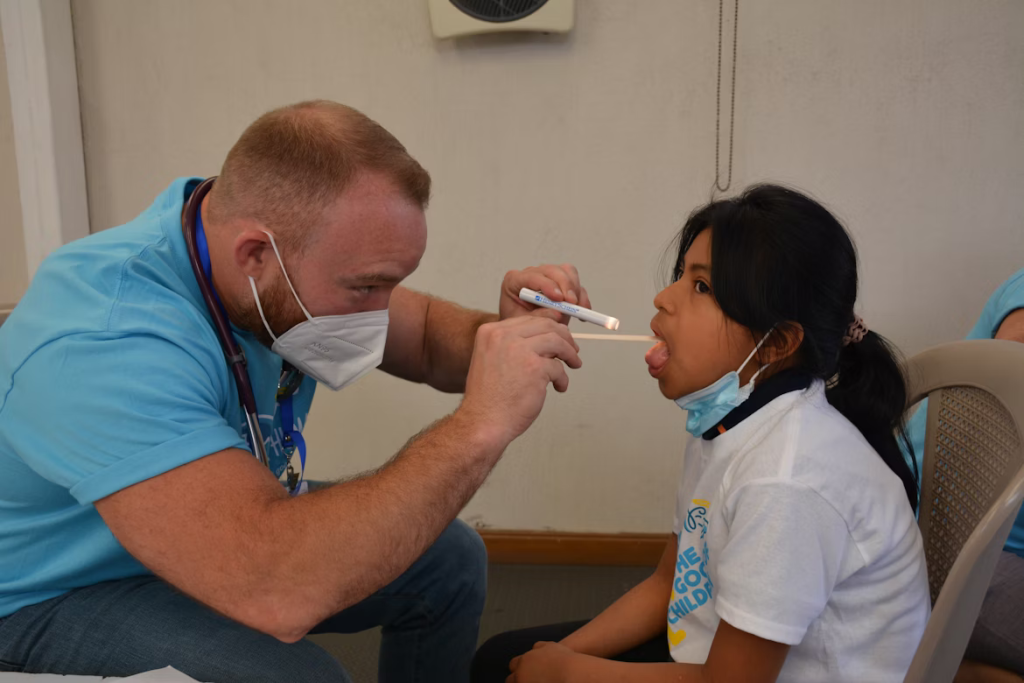The Coronavirus’s symptoms have changed drastically since the pandemic began. What started with the loss of smell and taste has evolved into different symptom patterns with each new variant. Now, doctors are tracking something. A new symptom called “razor blade throat” has appeared with the latest strain. This isn’t your typical viral sore throat. Patients describe discomfort so sharp it feels like swallowing broken glass. The issue has caught doctors’ attention because it seems much worse than regular throat irritation. Healthcare workers worldwide are seeing these reports as the new COVID variant spreads globally. But the razor blade throat isn’t the only unusual symptom emerging with this strain. Doctors are also documenting digestive issues suggesting this variant may be affecting the body in ways previous strains haven’t.
A New COVID Variant Takes Hold
The variant behind these reports goes by NB.1.8.1. Experts have nicknamed it “Nimbus.” The World Health Organization lists it as a “variant under monitoring.” This designation puts it on their watchlist without sounding major alarm bells. It’s spreading fast enough to get attention, but it doesn’t pose a major threat yet.

Nimbus first showed up in China this past January. It then spread worldwide. By mid-May, this strain made up nearly 11% of all samples worldwide. In the United States, it jumped from 15% to 37% of new cases in late May. This surge puts it almost equal to what was dominant before.
The “Razor Blade Throat” Phenomenon
Physicians across the United Kingdom, India, and several U.S. states have started seeing these unusual symptoms. These go far beyond the scratchy, mildly uncomfortable throat irritation typical of other viral infections. Patients describe pain so intense it feels like swallowing razor blades.
Infectious disease expert Dr. Aaron Glatt notes that while “razor blade throat” isn’t specific to the coronavirus, “this expression has been used to describe sore throat symptoms in some patients with the most recent COVID-19 variant.” Infectious disease specialist Dr. Cornejo confirms they’re seeing this severe throat pain alongside typical symptoms like runny nose, fever, nausea, and vomiting.
The virus attacks the cells in the back of the mouth and throat. This causes severe swelling of the throat lining that creates sharp stabbing pain.
Read More: Long Covid Researcher Opens Up About Her Struggles With The Condition
What Experts Are Saying
Doctors disagree on whether razor blade throat is truly a new unique symptom of this COVID Variant or if it’s simply heightened awareness of severe throat pain. Some specialists argue that intense throat pain has appeared with previous variants but may not have received the same attention or memorable description. Others point to the consistent reports across different countries as evidence of something genuinely different about this variant.

The timing raises questions about our understanding of coronavirus symptoms. A sore throat has been a recognized symptom since early in the pandemic, affecting roughly 70% of patients with various strains. This baseline makes it challenging to determine if Nimbus causes more severe throat symptoms. Medical professionals may be simply documenting cases more carefully now.
Immunity and Variant Concerns
There are still several key factors that remain uncertain to experts. The vaccination status of patients experiencing razor-blade throats is unclear in many reported cases. This makes it difficult to consider whether vaccinated individuals face the same risk of developing severe throat symptoms. Dr. Glatt notes that all new variants raise concerns about whether previous immunity provides enough protection against new strains.
Nimbus may spread more easily and could evade some immune responses due to its genetic changes. Dr. Glatt addresses this concern directly, stating “As with all new variants, there is always a concern that prior immunity may not be as protective.” However, new data suggests this COVID variant doesn’t appear more dangerous than previous versions. While it may spread efficiently, it likely won’t cause more severe overall illness compared to earlier strains.
Read More: Covid Surge from NB.1.8.1 Variant Prompts Mask and Lockdown Fears in UK
Should You Be Concerned?
Doctors have seen no increased risk of hospitalization compared to the other strains. The World Health Organization considers the public health risk low at the global level. While the razor-blade throat symptom sounds alarming and painful, it appears to be primarily a pain management issue rather than a harbinger of a more serious illness.
The vaccines remain effective against the Nimbus variant, with current vaccinations providing some protection levels against severe outcomes. However, certain groups should still exercise extra vigilance. The variant poses higher risks for immunocompromised individuals, those with weakened immune defenses, elderly patients, and people with underlying health conditions that can amplify the virus’s impact. These vulnerable persons should continue taking extra precautions regardless of the variant type.
You should seek medical attention if your throat pain doesn’t improve within a week. Also, seek care if you develop difficulty swallowing or if symptoms worsen. Remember that while most viral sore throats resolve by themselves, persistent severe pain may signal complications or other conditions requiring treatment.
Protect Yourself And Others From Exposure
With this new COVID variant spreading, if you develop severe throat pain or other symptoms, take a rapid antigen test to confirm if you’re infected.

This will help you make smart decisions about staying isolated and getting treatment while protecting others from exposure. Many rapid tests are available and can give you results in minutes. Monitor your symptoms carefully, especially how severe your throat pain is and how long it lasts. Pay attention to digestive symptoms too, as severe heartburn, bloating, or persistent stomach issues may point to this variant. Document when symptoms started and how they change, as this complete symptom tracking helps doctors assess your condition if you need medical care. Track fever patterns, any breathing changes, and your overall energy levels along with throat symptoms.
Read More: COVID-Unvaccinated People 48% More Prone to Traffic Crashes, Research Shows

